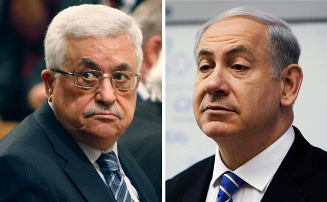Some Hard Truths about Recognition & Narratives
- The demand that the Palestinians not only recognize Israel - something they have done repeatedly, starting in 1993 - but that they recognize Israel as “a Jewish state,” or some similar wording, is relatively new. No such demand was made of Egypt or Jordan, nor was it mentioned in the Oslo agreement or subsequent Israeli-Palestinian documents. It made a brief appearance in the Annapolis talks of 2007, but only as a marginal issue. Only in 2009 did it truly come into play, courtesy of Benjamin Netanyahu.
- Netanyahu’s decision to introduce the issue into the Israeli-Palestinian negotiating dynamic seemed to be a cynical one. Facing a U.S. president determined to forge ahead with peace and a Palestinian president who embraced the two-state solution, rejected violence, and was actively cooperating to fight terrorism, Netanyahu was left scrambling for a pretext to argue that Israel had no Palestinian partner for peace, as cover for his own anti-peace, pro-settlement policies. Thus was born the “recognition-plus” demand, which today is accepted by many Israelis and supporters of Israel as a condition for any peace agreement, and even as a precondition for continuing to sit at the negotiating table with the Palestinians.
- While the introduction of the “recognition-plus” demand into the political debate was cynical, the demand has nonetheless resonated deeply with many Israelis and supporters of Israel – including many who support peace and the two-state solution and who are not seeking a pretext to avoid or derail negotiations.
- It resonates, at least in part, because it taps into two popular Israeli sentiments that relate to peace with their neighbors. One is desire to see the Jewish-Zionist narrative embraced – the longing of Israelis to not simply be tolerated in the Middle East, but to be accepted as a legitimate, indigenous nation, consistent with Israel’s founding narrative of the return of the Jews to their historic homeland. The other is the Israeli anxiety that even after a peace agreement, Palestinians will not be content with a state in the West Bank and Gaza, but will continue fighting to “liberate” all of Palestine, believing that it belongs to them and not Israel.
- For Palestinians, rejection of the demand to recognize Israel as a Jewish state (or some similar formula) is a function of their own historical and political narrative. According to this narrative, Palestinians are an indigenous people living for generations in the land between the Jordan River and the Mediterranean Sea, unjustly expelled or occupied as the result of the creation of Israel and subsequent disastrous wars.
- Israeli insistence that the Palestinians adopt an Israeli-dictated formula of “the Jewish state of Israel” or similar wording is understood by many Palestinians as requiring them to in effect renounce their national narrative and repudiate their own history, suffering, and grievances. It is viewed as asking them to recognize, in essence, prior Jewish claims that erase their own, both in terms of lands lost and as refugees.
- Moreover, this demand is seen by many – on both sides of the Green Line – as requiring Palestinian President Abbas to “sell out” the more than one million Palestinians who are citizens of Israel, sabotaging their own efforts to play an effective role in influencing the future character of the state of Israel and break down the barriers to equality inside Israel.
- The demand for “recognition-plus” and its rejection thus go to the heart of the Israeli-Palestinian conflict. They embody the shared desire of Israelis and Palestinians for self-determination in their own countries, and for acknowledgment of their core narratives. Recognizing what this argument is really about opens the door for Israelis and Palestinians to start grappling with the challenge of finding a recognition formula that addresses the needs, and respects the sensitivities, of both sides.
- Such a formula will require not just recognition of the fact of Israel’s existence, but some element of recognition of Israel as a home for the Jewish people in their historic homeland, alongside explicit recognition of the rights of non-Jewish citizens of Israel.
- On the flip side, such a formula will require not just grudging acceptance of a Palestinian state as the outcome of negotiations, but some element of recognition of the suffering and sacrifices that Israel’s creation and 46 years of occupation have wrought on the Palestinian people.
- Israeli and Palestinian leaders, negotiating in good faith to achieve a two-state solution, can certainly agree on a recognition formula – as was done by negotiators in the 2003 Geneva Initiative, which affirmed that the agreement marked, “the recognition of the right of the Jewish people to statehood and the recognition of the right of the Palestinian people to statehood, without prejudice to the equal rights of the Parties' respective citizens.
- Conversely, if Israel and Palestinian leaders don’t start dealing with this question seriously – respectful of the nuances and sensitivities involved for both sides – then the recognition question will haunt us all, and ensure that an agreement is likely never reached.

